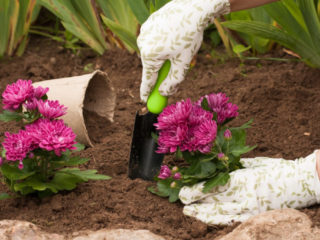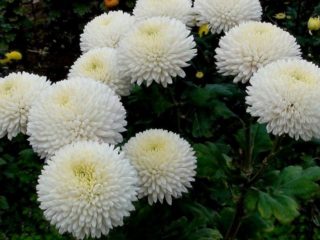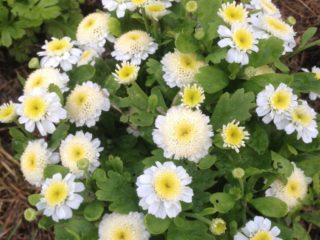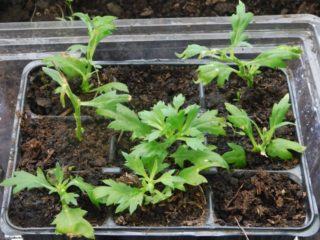Content
- 1 Is it possible to root a chrysanthemum from a bouquet
- 2 What chrysanthemums can be propagated by cuttings from a bouquet
- 3 How to prepare cuttings for growing chrysanthemums from a bouquet
- 4 How to grow a chrysanthemum with cuttings from a bouquet
- 5 How to plant a chrysanthemum from a bouquet in the open ground
- 6 Useful Tips
- 7 Conclusion
Most gardeners tend to root chrysanthemums from a bouquet. This is not only a creative, but also a profitable process: you can be sure of the color of the buds, there is no cost to buy a seedling.
Is it possible to root a chrysanthemum from a bouquet
There are several ways to reproduce a flower. Breeding chrysanthemums with cuttings is one of the common methods. For this, several flowers are selected from the bouquet. The success of the event depends on the correctly chosen plant and the planting algorithm.
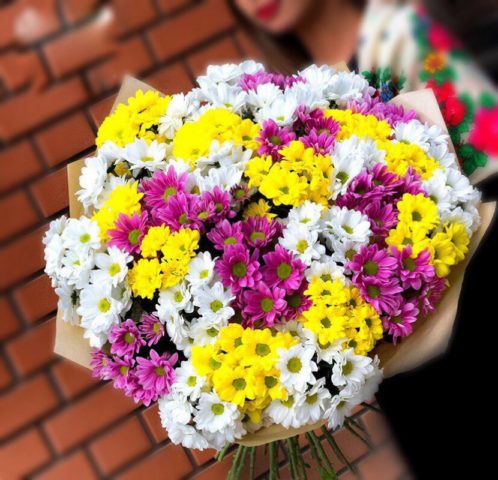
The advantage of rooting is the ability to choose a crop with certain varietal characteristics: a visual example allows you to find a specimen that is suitable in color and shape
What chrysanthemums can be propagated by cuttings from a bouquet
The rooting ability of the flower is high, so it is easy to propagate the plant. But if a copy for grafting is chosen unsuccessfully, then the chrysanthemum will not take root.
Choosing a flower requires the following:
- there is no rot on the stems of the culture;
- cuttings are strong, young, green in color and of medium thickness;
- the plant has lateral branches.
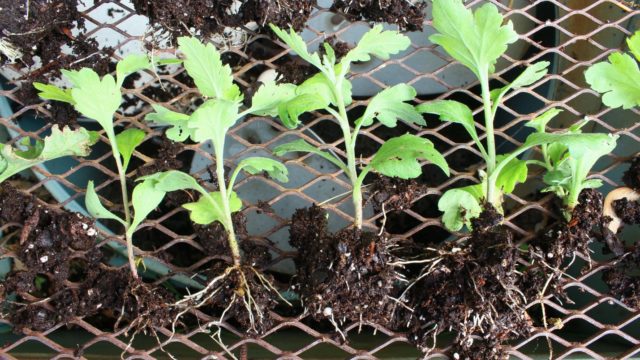
It is not recommended to harvest cuttings from non-woody or old shoots of chrysanthemums, the culture will not have enough strength for successful rooting
How to prepare cuttings for growing chrysanthemums from a bouquet
If a chrysanthemum has taken root in a vase, then this confirms its vitality.
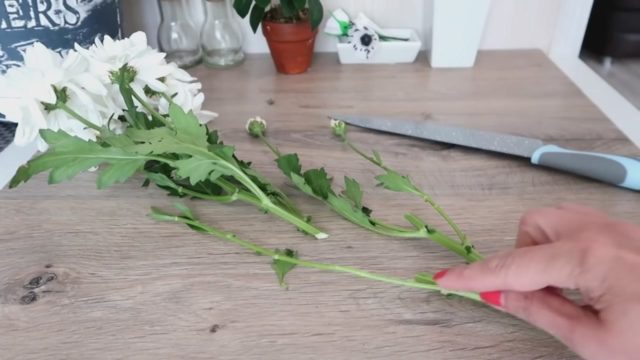
The rooting of the culture should be carried out in accordance with the time frame: flowers should stand for 1-2 days in a bouquet
Ideally, you should select for this the lateral processes from the main stem, on which there are no buds. This guarantees successful rooting in a short period of time. If it is impossible to choose side branches, cuttings are harvested from the shoots they like, which look strong and healthy.
Features of the preparation of planting material:
- shorten the selected shoots, leaving 12 cm;
- when trimming the stem, the angle must be maintained so that the mother stump is partially visible;
- on each chrysanthemum shoot there are 2-3 internodes and more than 2 pairs of leaf plates;
- pinch the top on the selected shoots so that the flower is more bushy;
- remove buds from shoots;
- in the lower part of the stem, the leaves are to be pruned.
In order for the cuttings of chrysanthemums from a freshly picked bouquet to be successful, you should provide everything you need at home: place the selected shoots in a container with purified water. The liquid level in the container should be up to 3 cm.
It is required to monitor the freshness of the water in the container: change it no more than once every 2 days.
To speed up the process, you can create a greenhouse effect: wrap a container with water and a plant cuttings with foil or cover with a lid.
Before placing the cuttings in the container, it must be treated with the Kornevin stimulant. To do this, place the shoot in the diluted preparation for 2 hours.
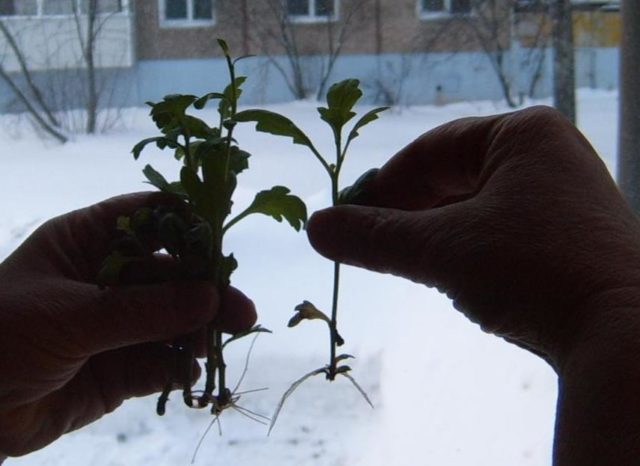
Initially, during rooting, a callus forms on the cuttings, which contributes to the overgrowth of the cut gradually, from nearby buds on the shoot
The first roots are usually formed 6-7 days after placing the shoots in water.
How to grow a chrysanthemum with cuttings from a bouquet
The appearance of roots indicates the vitality of the plant. To fully root the chrysanthemum from the donated bouquet, and then plant it in the fall or spring, you need to move the seedling into the ground.
Preparation of soil and planting capacity
The optimal time for the rooting of the selected shoot is January or February. If the bouquet was received in the winter, then the complete root system can be formed by spring, in order to subsequently transfer the plant to open ground.
If you root chrysanthemum from a bouquet in March or April, then transplant to the site is carried out in the fall.
When rooting chrysanthemums, it is important to pick up the soil: the flower does not like acidic soil. The best option for it is a neutral or slightly acidic substrate. It is recommended to add wood ash to the ground. To increase the fertility of the soil, humus and nitrophosphate are mixed with it. Acidity should be determined using test strips.
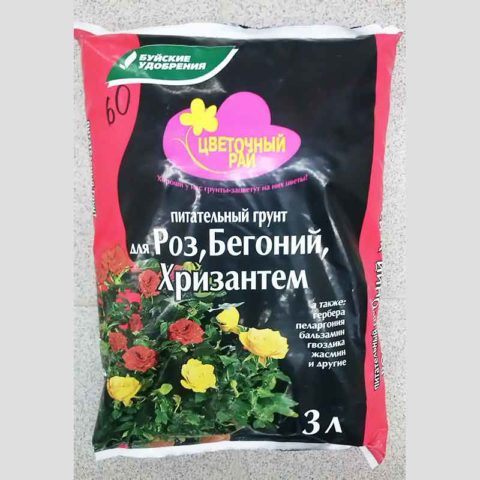
The correct proportions of all the substances necessary for a flower are contained in special mixtures that can be found in stores.
Often, perlite or hydrogel is preferred for rooting a culture. The mixture needs preliminary treatment with manganese solution or calcination.
The flower grows safely in loamy and sandy soils, so it is not recommended to neglect drainage: expanded clay or brick chips.
Each chrysanthemum shoot requires its own pot. You can also prepare seedling boxes for the rooting procedure.
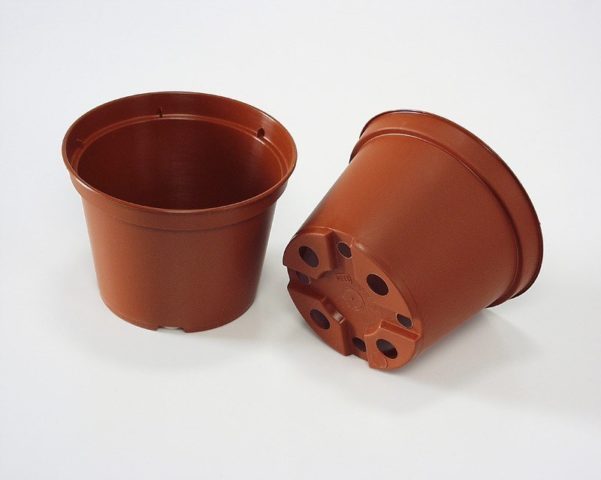
All containers must be clean and equipped with ventilation holes.
If you subsequently plan to grow a plant in a flowerpot, you should select a container for rooting a chrysanthemum so that its diameter is at least 30 cm.This requirement is based on the peculiarities of the root system of the culture: it grows in breadth.
Landing rules
The rooting procedure is simple:
- pour a layer of drainage and soil into the container;
- make a depression in it, place a rooted stalk there;
- water the seedling.
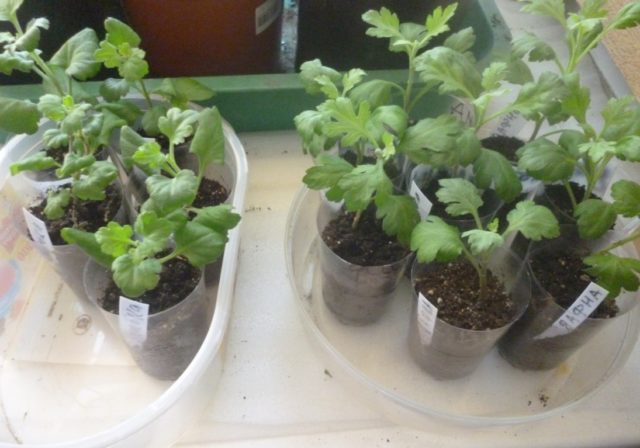
Rooted chrysanthemum must be placed on a windowsill where windows face west or east
Caring for cuttings of chrysanthemum from a bouquet
After the rooting procedure, the chrysanthemum needs a care organization:
- it is necessary to water it as the soil dries up;
- regularly humidify the air around the flower using a spray bottle;
- loosen the soil or mulch it with small pebbles or peat.
Top dressing should not be neglected: it is important to apply fertilizer for the first time 2 weeks after planting in a pot. For this, universal preparations are suitable, which include minerals: Kemira, Zdraven. Feeding after rooting chrysanthemum is required twice a month.
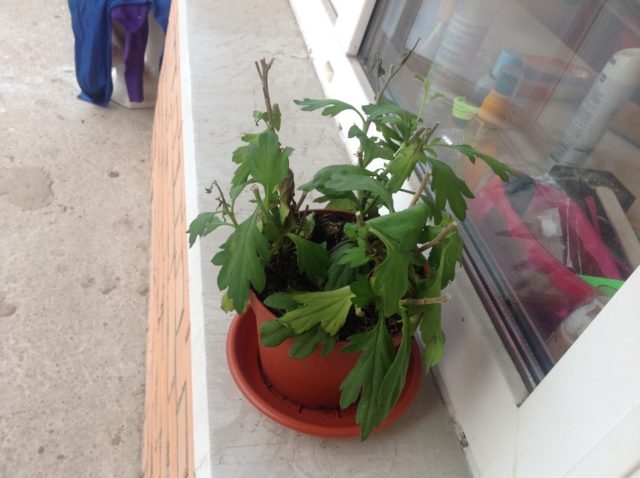
Chrysanthemum seedlings grow very quickly, so they need to be pinched
Removing the growth point forces the shrub to grow in more than one shoot. The procedure should be carried out when the stem has increased to 20 cm in length.
How to plant a chrysanthemum from a bouquet in the open ground
For Russian cities in the middle zone, the optimal time is the last month of spring or June, for the southern regions it is April and early May.
And although the propagation of chrysanthemums by cuttings obtained from a donated bouquet is feasible in the fall, gardeners prefer spring. It will be easier for the seedling to take root over the summer and take root before the onset of frost.
Landing Algorithm:
- prepare holes, retreating from each 40 cm in length and 40 cm in width;
- lay stones at the bottom of the holes as drainage;
- remove seedlings with a lump of earth, place in a hole, deepen and fill;
- water the chrysanthemums abundantly.
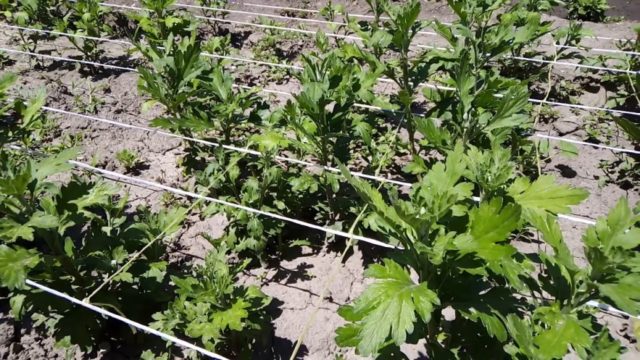
It is recommended to tie the flower or organize a support for it.
Within a few days after planting, the rooted chrysanthemum should be covered with a film so that the plant takes root faster.
Useful Tips
Chrysanthemum is a beautiful but capricious flower. When growing it on the site, it is necessary to allocate a special place, there should be no drafts, thick shade, moisture. Not suitable for cultivation of chrysanthemums and waterlogged gardens located in lowlands, or often flooded in spring.
The flower will bloom profusely and for a long time if it grows in fertile soil, the pH should be between 5.5 and 7.0.
A common pest that destroys chrysanthemum leaves is aphids. It quickly spreads throughout the plant and spreads to nearby growing crops.
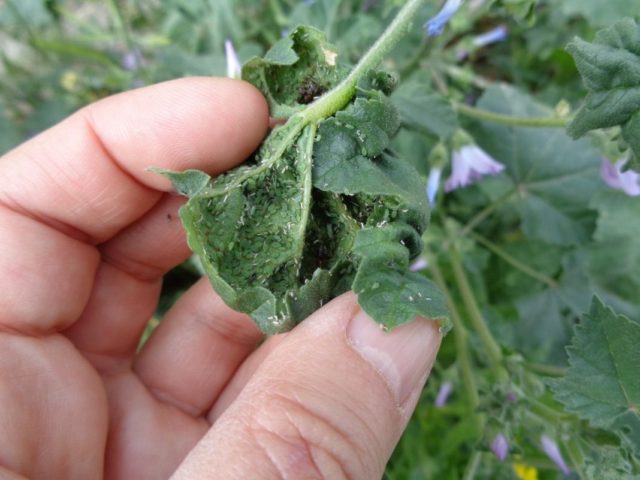
A safe method for killing aphids is a soap solution, which is used to periodically process the bush until the pest disappears completely.
Other tips for grafting chrysanthemums:
- if the flower has sprouted on its own while in the vase, then it is allowed to be transferred to the open ground entirely;
- when transplanting an adult bush into the garden, the main stem should be pruned, retaining only 4-5 leaf plates (this procedure will stimulate root formation);
- if buds have formed on the rooted cuttings, then they must be completely removed (the plant will not have enough reserve to form a full-fledged root system);
- for young flowers, low temperatures are destructive, so it is recommended to cover them, or remove them with the ground and move them to a room (to a balcony or to a basement), where they will winter safely.
Some gardeners prefer to plant the crop on the site directly in plastic containers in order to dig up the shrub in the fall without damaging the roots.
Conclusion
Any purposeful gardener is capable of rooting a chrysanthemum from a bouquet: patience and competent care will ensure the success of the event. Depending on the varietal characteristics, the buds usually form from the end of August to November, if there is no severe frost. The plant can be safely propagated on its own and transplanted as needed.

